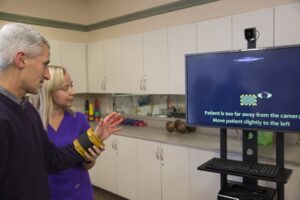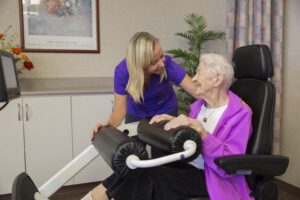Shallow Restrictive Breathing: A Modifiable Problem for Better Health
Overview:
When frail older adults don’t breathe well, they can’t move well and are at increased risk for comorbid problems. We are the first group in the country to study restrictive ventilatory patterns (RVP) in frail older adults. RVP contributes to two prevalent problems in older adults: 1) the development of pneumonia and other lower respiratory infections; and 2) declining endurance for physical activity.
Results:
We found that an astounding 51% of people in residential long-term care had spirometry-confirmed moderate or severe RVP. People with RVP were more likely to have lower muscle strength, a stooped posture, difficult breathing, and dementia. People who had RVP were less likely to still be walking independently, with or without an assistive device such as a cane or walker. No approved therapies currently exist to treat RVP in frail older adults. Addressing the problems uncovered in our research has the potential to improve strength, decrease or delay functional decline, and prevent pneumonia. The full study was published: Kovach, C. R., Taani, M. H., Evans, C. R., Kelber, S., & Margolis, I. (2019). Restrictive Ventilatory Patterns in Residents of Continuing Care Retirement Communities. Western journal of nursing research, 41(3), 355-371. Based on the results of this study we developed the Breathing Room Intervention and are currently testing its effectiveness.


